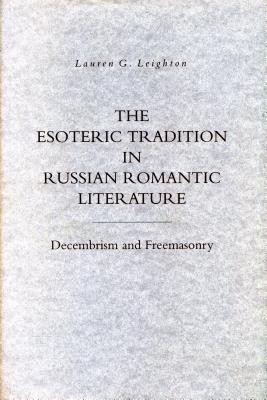
- We will send in 10–14 business days.
- Author: Lauren G Leighton
- Publisher: Penn State University Press
- ISBN-10: 0271026510
- ISBN-13: 9780271026510
- Format: 15.2 x 22.9 x 1.4 cm, softcover
- Language: English
- SAVE -10% with code: EXTRA
The Esoteric Tradition in Russian Romantic Literature (e-book) (used book) | bookbook.eu
Reviews
Description
The European esoteric tradition was introduced into Russia in the eighteenth century by Freemasons and continued in Russian romantic literature of the early nineteenth century.
This study, which conjoins historiographical methods developed by modern scholars of esoterica and formalist methods of textual analysis, reveals the role of that tradition in Russian romantic literature. It deals extensively with Decembrism, the political conspiracy so known after its culmination in a failed attempt to overthrow the tsarist autocracy in December 1825. The Decembrist writers and other romantics influenced by Freemasonry, including Kondraty Ryleyev, Alexander Bestuzhev-Marlinsky, and Alexander Pushkin, were adept in the application of thaumaturgical skills to literature. Thaumaturgy denotes the application of arcane skills, some derived from the Cabala, to both the interpretation and creation of encoded literary texts.
The Esoteric Tradition in Russian Romantic Literature also deals with the relationships between Russia's national poet and those writers who made the first major attempt at a Russian revolution. Viewing these relationships through the prism of occult imagery used in various literary works, Leighton tells an engaging story of political intrigue and communication by secret codes.
EXTRA 10 % discount with code: EXTRA
The promotion ends in 16d.09:18:16
The discount code is valid when purchasing from 10 €. Discounts do not stack.
- Author: Lauren G Leighton
- Publisher: Penn State University Press
- ISBN-10: 0271026510
- ISBN-13: 9780271026510
- Format: 15.2 x 22.9 x 1.4 cm, softcover
- Language: English English
The European esoteric tradition was introduced into Russia in the eighteenth century by Freemasons and continued in Russian romantic literature of the early nineteenth century.
This study, which conjoins historiographical methods developed by modern scholars of esoterica and formalist methods of textual analysis, reveals the role of that tradition in Russian romantic literature. It deals extensively with Decembrism, the political conspiracy so known after its culmination in a failed attempt to overthrow the tsarist autocracy in December 1825. The Decembrist writers and other romantics influenced by Freemasonry, including Kondraty Ryleyev, Alexander Bestuzhev-Marlinsky, and Alexander Pushkin, were adept in the application of thaumaturgical skills to literature. Thaumaturgy denotes the application of arcane skills, some derived from the Cabala, to both the interpretation and creation of encoded literary texts.
The Esoteric Tradition in Russian Romantic Literature also deals with the relationships between Russia's national poet and those writers who made the first major attempt at a Russian revolution. Viewing these relationships through the prism of occult imagery used in various literary works, Leighton tells an engaging story of political intrigue and communication by secret codes.


Reviews